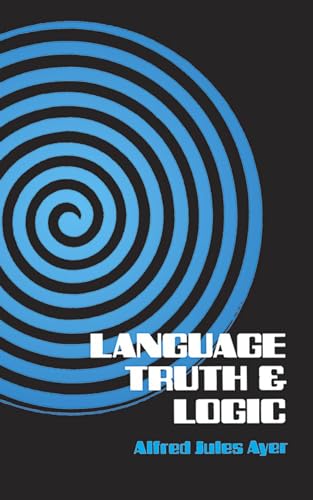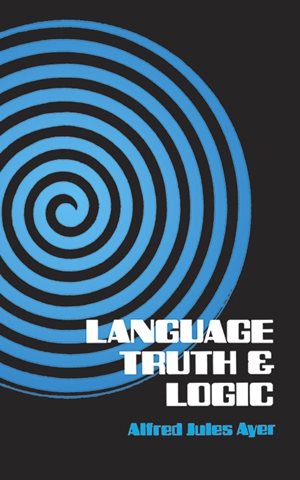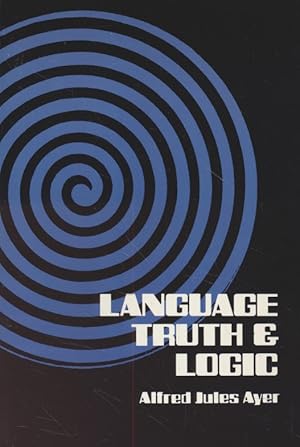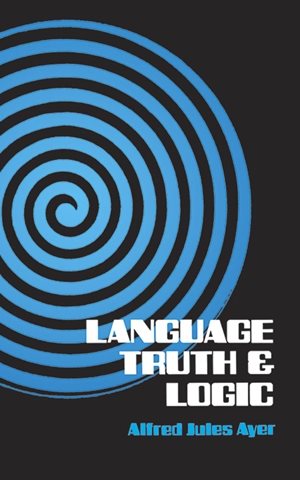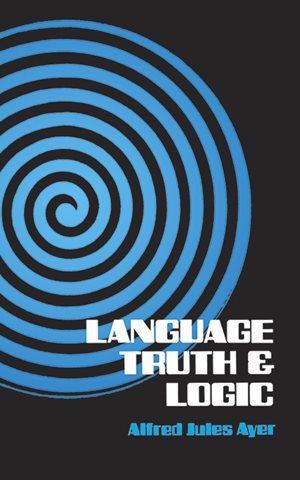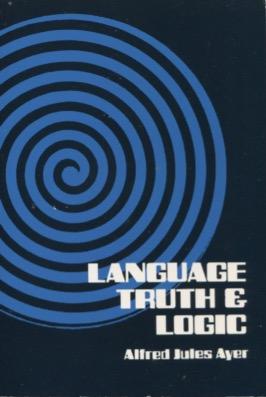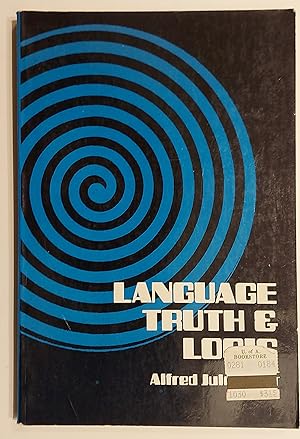language truth logic di sir alfred jules ayer (50 risultati)
FeedbackFiltri di ricerca
Tipo di articolo
- Tutti i tipi di prodotto
- Libri (50)
- Riviste e Giornali (Nessun altro risultato corrispondente a questo perfezionamento)
- Fumetti (Nessun altro risultato corrispondente a questo perfezionamento)
- Spartiti (Nessun altro risultato corrispondente a questo perfezionamento)
- Arte, Stampe e Poster (Nessun altro risultato corrispondente a questo perfezionamento)
- Fotografie (Nessun altro risultato corrispondente a questo perfezionamento)
- Mappe (Nessun altro risultato corrispondente a questo perfezionamento)
- Manoscritti e Collezionismo cartaceo (Nessun altro risultato corrispondente a questo perfezionamento)
Condizioni Maggiori informazioni
Legatura
- Tutte
- Rilegato (Nessun altro risultato corrispondente a questo perfezionamento)
- Brossura (50)
Ulteriori caratteristiche
- Prima ed. (1)
- Copia autograf. (Nessun altro risultato corrispondente a questo perfezionamento)
- Sovracoperta (Nessun altro risultato corrispondente a questo perfezionamento)
- Con foto (13)
- Non Print on Demand (50)
Lingua (3)
Spedizione gratuita
- Spedizione gratuita in Italia (Nessun altro risultato corrispondente a questo perfezionamento)
Paese del venditore
Valutazione venditore
-
Language, Truth and Logic (Dover Books on Western Philosophy)
Da: SustainableBooks.com, Amherst, NY, U.S.A.
EUR 4,79
Convertire valutaEUR 14,06 per la spedizione da U.S.A. a ItaliaQuantità: 1 disponibili
Aggiungi al carrelloCondizione: Poor. Book is Poor condition. Good for reading, not pretty to look at! The pages and cover are soiled and/or yellowed, worn throughout. 0.4.
-
Language, Truth and Logic (Dover Books on Western Philosophy)
Da: California Books, Miami, FL, U.S.A.
EUR 11,41
Convertire valutaEUR 7,67 per la spedizione da U.S.A. a ItaliaQuantità: 5 disponibili
Aggiungi al carrelloCondizione: New.
-
EUR 10,81
Convertire valutaEUR 11,55 per la spedizione da Regno Unito a ItaliaQuantità: 2 disponibili
Aggiungi al carrelloPaperback. Condizione: Brand New. reprint edition. 160 pages. 8.00x5.50x0.50 inches. In Stock.
-
EUR 5,36
Convertire valutaEUR 17,04 per la spedizione da U.S.A. a ItaliaQuantità: Più di 20 disponibili
Aggiungi al carrelloCondizione: good. May show signs of wear, highlighting, writing, and previous use. This item may be a former library book with typical markings. No guarantee on products that contain supplements Your satisfaction is 100% guaranteed. Twenty-five year bookseller with shipments to over fifty million happy customers.
-
Language, Truth and Logic by Alfred J. Ayer, Sir Alfred Jules Ayer 2nd (second) Edition [Paperback(1952)]
Editore: Dover Publications
Da: ThriftBooks-Atlanta, AUSTELL, GA, U.S.A.
EUR 15,09
Convertire valutaEUR 2,56 per la spedizione da U.S.A. a ItaliaQuantità: 1 disponibili
Aggiungi al carrelloPaperback. Condizione: Good. No Jacket. Pages can have notes/highlighting. Spine may show signs of wear. ~ ThriftBooks: Read More, Spend Less 0.4.
-
Language, Truth and Logic. Dover Books on Western Philosophy.
Editore: New York: Dover Publications 06.1952., 1952
ISBN 10: 0486200108 ISBN 13: 9780486200101
Lingua: Inglese
Da: Fundus-Online GbR Borkert Schwarz Zerfaß, Berlin, Germania
EUR 15,00
Convertire valutaEUR 9,00 per la spedizione da Germania a ItaliaQuantità: 1 disponibili
Aggiungi al carrelloPaperback. Condizione: Gut. 160 p. Fresh and clean copy with some markings in pencil and signs of wear on the front cover. Frisches und sauberes Exemplar mit einigen Bleistiftmarkierungen und Gebrauchsspuren auf dem Vorderdeckel. CONTENTS Introduction Preface Ch. I. The Elimination of Metaphysics p, 33' What is the purpose and method of philosophy? Rejection of the metaphysical thesis that philosophy affords us knowledge of a transcendent reality. 34: Kant also rejected metaphysics in this sense, but whereas he accused metaphysicians of ignoring the limits of the human understanding we accuse them of disobeying the rules which govern the significant use of language. 33: Adoption of verifiability as a criterion for testing the significance of putative statements of fact. 36: Distinction between conclusive and partial verification. No propositions can be conclusively verified. 38: Or conclusively confuted. 38: For a statement of fact to be genuine some possible observations must be relevant to the determination of its truth or falsehood. 39: Examples of the kinds of assertions, familiar to philosophers, which are ruled out by our criterion. 41: Metaphysical sentences defined as sentences which express neither tautologies nor empirical hypotheses. 42: Linguistic confusions the prime source of metaphysics. 44: Metaphysics and Poetry. Ch. II. The Function of Philosophy p. 46: Philosophy is not a search for first principles. 46: Barrenness of Descartes' procedure. 48: The function of philosophy is wholly critical. But this does not mean that it can give an a priori justification of our scientific or common-sense assumptions. 49: There is no genuine problem of induction, as ordinarily conceived. 31: Philosophising is an activity of analysis. 31: Most of those who are commonly thought to have been great philosophers were philosophers in our sense, rather than metaphysicians. 32: Locke, Berkeley, Hume as analysts. 53: We adopt Berkeley's phenomenalism without his theism. 34: And take a Humean view of causation. 56: Philosophy in our sense is wholly independent of metaphysics. We are not committed to any doctrine of atomism. 57; The philosopher as an analyst is not concerned with the physical properties of things, but only with the way in which we speak about them. 38: Linguistic propositions disguised in factual terminology. 39: Philosophy issues in definitions. Ch. III. The Nature of Philosophical Analysis p. 39: Philosophy provides not explicit definitions, such as are given in dictionaries, but definitions in use. Explanation of this distinction. 60: Russell's "theory of descriptions" as an example of philosophical analysis. 62: Definition of an ambiguous symbol. 63: Definition of a logical construction. 64: Material things are logical constructions out of sense-contents. 64: By defining the notion of a material thing in terms of sense-contents we solve the so-called problem of perception. 63: A solution of this problem outlined as a further example of philosophical analysis. 68: Utility of such analyses. 68: Danger of saying that philosophy is concerned with meaning. 70; The propositions of philosophy are not empirical propositions concerning the way in which people actually use words. They are concerned with the logical consequences of linguistic conventions. 71: Rejection of the view that "every language has a structure concerning which in the language nothing can be said." Ch. IV. The A Priori p. 71: As empiricists, we must deny that any general proposition concerning a matter of fact can be known certainly to be valid. 72: How then are we to deal with the propositions of formal logic and mathematics? 74: Rejection of Mill's view that these propositions are inductive generalisations. 77: They are necessarily true because they are analytic. 77: Kant's definitions of analytic and synthetic judgements. 78: Emendation of Kant's definitions. 79: Analytic propositions are tautological; they say nothing concerning any matter of fact. 80: But they give us new knowledge, inasmuch as they bring to light the implications of our linguistic usages. 81: Logic does not describe "the laws of thought." 82: Nor geometry the properties of physical space. 84: Our account of a priori truths undermines Kant's transcendental system. 83: How, if they are tautological, can there be in mathematics and logic the possibility of invention and discovery? Ch. V. Truth and Probability p. 87: What is truth? 88: Definition of a proposition. 88: The words "true" and "false" function in the sentence simply as assertion and negation signs. 90: The "problem of truth" reduced to the question, How are propositions validated? 90: The criterion of the validity of empirical propositions is not purely formal. 91: No empirical propositions are certain, not even those which refer to immediate experience. 94: Observation confirms or discredits not just a single hypothesis but a system of hypotheses. 93: The "facts of experience" can never compel us to abandon a hypothesis. 96: Danger of mistaking synthetic for analytic propositions. 97: Hypotheses as rules which govern our expectation of future experience. 100: Definition of rationality. 101: Definition of probability in terms of rationality. 101: Propositions referring to the past. Ch. VI. Critique of Ethics and Theology p. 102: How does an empiricist deal with assertions of value? 103: Distinction between various types of ethical enquiry. 104: Utilitarian and subjectivist theories of ethics consistent with empiricism. 103: But unacceptable on other grounds. 105: Distinction between normative and descriptive ethical symbols. 106: Rejection of intuitionism. 107: Assertions of value are not scientific but "emotive." 107: They are therefore neither true nor false. 108: They axe partly expressions of feeling, partly commands. 109: Distinction between expressions and assertions of feeling, no: Objection that this view makes 1 impossible to dispute about questions of value, no: Actually, we never do dispute about ques.
-
Language, Truth and Logic. Dover Books on Western Philosophy.
Editore: New York: Dover Publications 06.1952., 1952
ISBN 10: 0486200108 ISBN 13: 9780486200101
Lingua: Inglese
Da: Fundus-Online GbR Borkert Schwarz Zerfaß, Berlin, Germania
EUR 15,00
Convertire valutaEUR 9,00 per la spedizione da Germania a ItaliaQuantità: 1 disponibili
Aggiungi al carrelloPaperback. Condizione: Gut. 160 p. Lediglich der Einband ist leicht berieben, sonst ein gutes und sauberes Exemplar ohne Anstreichungen / Only the cover is slightly rubbed, otherwise a good and clean copy without annotations. - CONTENTS Introduction Preface Ch. I. The Elimination of Metaphysics p, 33' What is the purpose and method of philosophy? Rejection of the metaphysical thesis that philosophy affords us knowledge of a transcendent reality. 34: Kant also rejected metaphysics in this sense, but whereas he accused metaphysicians of ignoring the limits of the human understanding we accuse them of disobeying the rules which govern the significant use of language. 33: Adoption of verifiability as a criterion for testing the significance of putative statements of fact. 36: Distinction between conclusive and partial verification. No propositions can be conclusively verified. 38: Or conclusively confuted. 38: For a statement of fact to be genuine some possible observations must be relevant to the determination of its truth or falsehood. 39: Examples of the kinds of assertions, familiar to philosophers, which are ruled out by our criterion. 41: Metaphysical sentences defined as sentences which express neither tautologies nor empirical hypotheses. 42: Linguistic confusions the prime source of metaphysics. 44: Metaphysics and Poetry. Ch. II. The Function of Philosophy p. 46: Philosophy is not a search for first principles. 46: Barrenness of Descartes' procedure. 48: The function of philosophy is wholly critical. But this does not mean that it can give an a priori justification of our scientific or common-sense assumptions. 49: There is no genuine problem of induction, as ordinarily conceived. 31: Philosophising is an activity of analysis. 31: Most of those who are commonly thought to have been great philosophers were philosophers in our sense, rather than metaphysicians. 32: Locke, Berkeley, Hume as analysts. 53: We adopt Berkeley's phenomenalism without his theism. 34: And take a Humean view of causation. 56: Philosophy in our sense is wholly independent of metaphysics. We are not committed to any doctrine of atomism. 57; The philosopher as an analyst is not concerned with the physical properties of things, but only with the way in which we speak about them. 38: Linguistic propositions disguised in factual terminology. 39: Philosophy issues in definitions. Ch. III. The Nature of Philosophical Analysis p. 39: Philosophy provides not explicit definitions, such as are given in dictionaries, but definitions in use. Explanation of this distinction. 60: Russell's "theory of descriptions" as an example of philosophical analysis. 62: Definition of an ambiguous symbol. 63: Definition of a logical construction. 64: Material things are logical constructions out of sense-contents. 64: By defining the notion of a material thing in terms of sense-contents we solve the so-called problem of perception. 63: A solution of this problem outlined as a further example of philosophical analysis. 68: Utility of such analyses. 68: Danger of saying that philosophy is concerned with meaning. 70; The propositions of philosophy are not empirical propositions concerning the way in which people actually use words. They are concerned with the logical consequences of linguistic conventions. 71: Rejection of the view that "every language has a structure concerning which in the language nothing can be said." Ch. IV. The A Priori p. 71: As empiricists, we must deny that any general proposition concerning a matter of fact can be known certainly to be valid. 72: How then are we to deal with the propositions of formal logic and mathematics? 74: Rejection of Mill's view that these propositions are inductive generalisations. 77: They are necessarily true because they are analytic. 77: Kant's definitions of analytic and synthetic judgements. 78: Emendation of Kant's definitions. 79: Analytic propositions are tautological; they say nothing concerning any matter of fact. 80: But they give us new knowledge, inasmuch as they bring to light the implications of our linguistic usages. 81: Logic does not describe "the laws of thought." 82: Nor geometry the properties of physical space. 84: Our account of a priori truths undermines Kant's transcendental system. 83: How, if they are tautological, can there be in mathematics and logic the possibility of invention and discovery? Ch. V. Truth and Probability p. 87: What is truth? 88: Definition of a proposition. 88: The words "true" and "false" function in the sentence simply as assertion and negation signs. 90: The "problem of truth" reduced to the question, How are propositions validated? 90: The criterion of the validity of empirical propositions is not purely formal. 91: No empirical propositions are certain, not even those which refer to immediate experience. 94: Observation confirms or discredits not just a single hypothesis but a system of hypotheses. 93: The "facts of experience" can never compel us to abandon a hypothesis. 96: Danger of mistaking synthetic for analytic propositions. 97: Hypotheses as rules which govern our expectation of future experience. 100: Definition of rationality. 101: Definition of probability in terms of rationality. 101: Propositions referring to the past. Ch. VI. Critique of Ethics and Theology p. 102: How does an empiricist deal with assertions of value? 103: Distinction between various types of ethical enquiry. 104: Utilitarian and subjectivist theories of ethics consistent with empiricism. 103: But unacceptable on other grounds. 105: Distinction between normative and descriptive ethical symbols. 106: Rejection of intuitionism. 107: Assertions of value are not scientific but "emotive." 107: They are therefore neither true nor false. 108: They axe partly expressions of feeling, partly commands. 109: Distinction between expressions and assertions of feeling, no: Objection that this view makes 1 impossible to dispute about questions of value, no: Actually, we never do dispute about questi.
-
EUR 7,36
Convertire valutaEUR 17,04 per la spedizione da U.S.A. a ItaliaQuantità: 5 disponibili
Aggiungi al carrelloCondizione: New.
-
EUR 7,36
Convertire valutaEUR 17,04 per la spedizione da U.S.A. a ItaliaQuantità: 5 disponibili
Aggiungi al carrelloCondizione: As New. Unread book in perfect condition.
-
Language, Truth and Logic (Dover Books on Western Philosophy)
Da: Black Gull Books (P.B.F.A.), St Leonard's on Sea, Regno Unito
Membro dell'associazione: PBFA
EUR 5,95
Convertire valutaEUR 19,81 per la spedizione da Regno Unito a ItaliaQuantità: 1 disponibili
Aggiungi al carrellopaperback. Condizione: Very Good. 2nd.
-
EUR 5,26
Convertire valutaEUR 21,30 per la spedizione da U.S.A. a ItaliaQuantità: 1 disponibili
Aggiungi al carrelloCondizione: Very Good. Very Good condition. A copy that may have a few cosmetic defects. May also contain light spine creasing or a few markings such as an owner's name, short gifter's inscription or light stamp.
-
EUR 5,26
Convertire valutaEUR 21,30 per la spedizione da U.S.A. a ItaliaQuantità: 2 disponibili
Aggiungi al carrelloCondizione: Good. Good condition. A copy that has been read but remains intact. May contain markings such as bookplates, stamps, limited notes and highlighting, or a few light stains. Bundled media such as CDs, DVDs, floppy disks or access codes may not be included.
-
EUR 9,68
Convertire valutaEUR 17,33 per la spedizione da Regno Unito a ItaliaQuantità: Più di 20 disponibili
Aggiungi al carrelloCondizione: good. May show signs of wear, highlighting, writing, and previous use. This item may be a former library book with typical markings. No guarantee on products that contain supplements Your satisfaction is 100% guaranteed. Twenty-five year bookseller with shipments to over fifty million happy customers.
-
EUR 12,30
Convertire valutaEUR 17,33 per la spedizione da Regno Unito a ItaliaQuantità: 8 disponibili
Aggiungi al carrelloCondizione: New.
-
EUR 12,30
Convertire valutaEUR 17,33 per la spedizione da Regno Unito a ItaliaQuantità: 8 disponibili
Aggiungi al carrelloCondizione: As New. Unread book in perfect condition.
-
Language, Truth and Logic
Editore: Dover Publications June 1952, 1952
ISBN 10: 0486200108 ISBN 13: 9780486200101
Lingua: Inglese
Da: Eagle Eye Books, Decatur, GA, U.S.A.
EUR 4,38
Convertire valutaEUR 25,57 per la spedizione da U.S.A. a ItaliaQuantità: 1 disponibili
Aggiungi al carrelloPaper Back. Condizione: Used.
-
Language, Truth and Logic
Editore: Dover Publications June 1952, 1952
ISBN 10: 0486200108 ISBN 13: 9780486200101
Lingua: Inglese
Da: Dunaway Books, St. Louis, MO, U.S.A.
EUR 5,27
Convertire valutaEUR 25,57 per la spedizione da U.S.A. a ItaliaQuantità: 1 disponibili
Aggiungi al carrelloPaper Back. Condizione: Good.
-
EUR 5,78
Convertire valutaEUR 25,55 per la spedizione da U.S.A. a ItaliaQuantità: 1 disponibili
Aggiungi al carrelloCondizione: New. SUPER FAST SHIPPING.
-
EUR 3,38
Convertire valutaEUR 29,83 per la spedizione da U.S.A. a ItaliaQuantità: 2 disponibili
Aggiungi al carrelloCondizione: Good. Item in good condition and has highlighting/writing on text. Used texts may not contain supplemental items such as CDs, info-trac etc.
-
Language, Truth and Logic (Dover Books on Western Philosophy)
Da: Dan A. Domike, Hoquiam, WA, U.S.A.
EUR 1,98
Convertire valutaEUR 38,35 per la spedizione da U.S.A. a ItaliaQuantità: 1 disponibili
Aggiungi al carrelloSoft cover. Condizione: Good. No Jacket. 2nd Edition. Some wear to the wraps. A few highlights throughout that do not affect the text. Otherwise a sturdy copy.
-
EUR 4,38
Convertire valutaEUR 37,50 per la spedizione da U.S.A. a ItaliaQuantità: 1 disponibili
Aggiungi al carrelloPaperback. Condizione: Good. 1950s printing. Slight edge wear to cover, else a clean, tight copy.
-
Language, Truth and Logic (Dover Books on Western Philosophy)
Editore: Dover Publications, Mineola, New York, 1952
ISBN 10: 0486200108 ISBN 13: 9780486200101
Lingua: Inglese
Da: Kenneth A. Himber, Lebanon, NJ, U.S.A.
EUR 9,22
Convertire valutaEUR 32,89 per la spedizione da U.S.A. a ItaliaQuantità: 1 disponibili
Aggiungi al carrelloSoft cover. Condizione: As New. Softcover Edition, Printing Not Listed. Softcover book is a clean tight unmarked copy.
-
Language, Truth and Logic (Dover Books on Western Philosophy)
Da: Priceless Books, Urbana, IL, U.S.A.
EUR 5,71
Convertire valutaEUR 38,35 per la spedizione da U.S.A. a ItaliaQuantità: 1 disponibili
Aggiungi al carrelloSoft cover. Condizione: Good. 2nd Edition. 160pp. Covers rubbed & lightly soiled; lamination peeling on covers. Footnotes & index. 2nd Edition.
-
EUR 6,14
Convertire valutaEUR 38,35 per la spedizione da U.S.A. a ItaliaQuantità: 1 disponibili
Aggiungi al carrellopaperback. Condizione: Very Good. Very Good. Lightly used, may have light reading wear and/or publisher's or previous owner's markings, but NO markings in text. Pasadena's finest new and used bookstore since 1992.
-
Language, Truth and Logic (Dover Books on Western Philosophy)
Da: Mister-Seekers Bookstore, Edmonton, AB, Canada
EUR 14,45
Convertire valutaEUR 16,15 per la spedizione da Canada a ItaliaQuantità: 1 disponibili
Aggiungi al carrelloSoft cover. Condizione: Very Good. 2nd Edition. In Excellent Used Condition. May Have Minor Shelf Wear To Edges. For More Information On Condition. Please See All Photos. - Classic Introduction To Objectives & Methods Of Schools Of Empiricism & Linguistic Analysis, Especially Of The Logical Positivism Derived From The Vienna Circle. Topics: Elimination Of Metaphysics, Function Of Philosophy, Nature Of Philosophical Analysis, The A Priori, Truth & Probability, Critique Of Ethics & Theology, Self & The Common World Etc. Introduction The Elimination Of Metaphysics The Function Of Philosophy The Nature Of Philosophical Analysis The A Priori Truth & Probability Critique Of Ethics & Theology The Self & The Common World Solutions Of Outstanding Philosophical Disputes.
-
Language, Truth and Logic (Dover Books on Western Philosophy)
Da: J. C. Burris, Bookseller, Plantation, FL, U.S.A.
EUR 8,78
Convertire valutaEUR 36,60 per la spedizione da U.S.A. a ItaliaQuantità: 1 disponibili
Aggiungi al carrelloSoft cover. Condizione: As New. 2nd Edition. Unread copy, embossed private library seal. box 304.
-
LANGUAGE TRUTH AND LOGIC (Dover Books on Western Philosophy)
Editore: Dover Publications, U.S.A., 1952
ISBN 10: 0486200108 ISBN 13: 9780486200101
Lingua: Inglese
Da: 100POCKETS, Berkeley, CA, U.S.A.
EUR 14,49
Convertire valutaEUR 38,35 per la spedizione da U.S.A. a ItaliaQuantità: 1 disponibili
Aggiungi al carrelloSoft cover. Condizione: Tzqx. Dover Reprint. Text/Bright, clean, AS NEW. Softcover/NF; strong with light edge & surface wear. Classic, 1936 exposition from British philosopher Sir Alfred Jules "Freddie" Ayer (1910 - 1989) at the young age of twenty-six. This Dover reprint carries introductory words from Ayer dated 1946. The heart of this volume on logical positivism centers on the concept of the Verification Principle as the only valid basis for philosophy. Therefore, statements like "God exists" or "charity is good" are neither true nor untrue, but meaningless, and may thus be excluded or ignored. A first rate antidote for "fuzzy thought and muddled writing ." 8 chapters:I, The Elimination of Metaphysics; II, The Function of Philosophy; III, The Nature of Philosophical Analysis; IV,The A Priori; V, Truth & Probability; VI, Critique of Ethics & Philosophy; VII, The Self & the Common World; and VIII, Solutions of Outstanding Philosophical Disputes.
-
Language, Truth and Logic by Alfred J. Ayer, Sir Alfred Jules Ayer 2nd (second) Edition [Paperback(1952)]
Editore: Dover Publications
Da: Pella Books, Pella, IA, U.S.A.
EUR 9,61
Convertire valutaEUR 31,10 per la spedizione da U.S.A. a ItaliaQuantità: 1 disponibili
Aggiungi al carrelloTrade Paperback. Condizione: Used Good.
-
Language, Truth and Logic (Dover Books on Western Philosophy)
Da: Once Upon A Time Books, Siloam Springs, AR, U.S.A.
EUR 1,56
Convertire valutaEUR 63,91 per la spedizione da U.S.A. a ItaliaQuantità: 1 disponibili
Aggiungi al carrelloPaperback. Condizione: Acceptable. This is a used book. It may contain highlighting/underlining and/or the book may show heavier signs of wear . It may also be ex-library or without dustjacket. This is a used book. It may contain highlighting/underlining and/or the book may show heavier signs of wear . It may also be ex-library or without dustjacket.
-
Language, Truth and Logic (Dover Books on Western Philosophy)
Da: Midtown Scholar Bookstore, Harrisburg, PA, U.S.A.
EUR 2,60
Convertire valutaEUR 63,87 per la spedizione da U.S.A. a ItaliaQuantità: 1 disponibili
Aggiungi al carrelloPaperback. Condizione: Good. Good paperback, bumped/creased with shelfwear; may have previous owner's name inside. Standard-sized.


